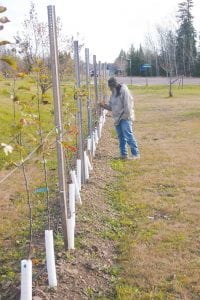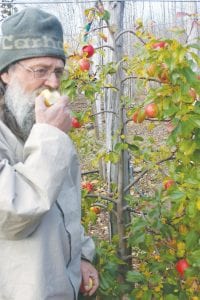Ray Block checks out apple trees he planted at Stan Bautch’s property located about a half mile east of Grand Marais. Future plans are to add more rows to make a better fire barrier at the site. Block is on a mission to introduce healthy organic apple orchards to the area that can offer fire suppression as well as bring potential income to growers.

“Rows of properly hydrated apple trees make great fire blocks,” said Ray Block, who was standing in the middle of his neatly kept orchard located near the shore of Lake Superior.
“Plus,” he said as took a bite out of a plump red Honey Crisp, “there is always the reward of eating them or giving them away as presents.”
With the constant clucking of sweet natured chickens pecking at his feet begging for apple bits, Block explained why he was on a mission to see apple trees planted from “Colvill to Duluth.”
“They could become a big part of fire suppression in the Northland and they could be used to make money for people. Honey Crisps sell for $7 a bag. At about 70 apples per bushel, an acre will produce over 1,000 bushels of apples. That’s a lot of bags of apples that can be sold,” he said with a smile.
But make no mistake; Block isn’t in this for the money. He is passionate about apples, and he wants to share that knowledge.

Sampling one of his many varieties of apples, Ray Block checks for texture and taste before giving the left over to the chickens, which roam his orchard and keep it relatively free of bugs.
“I think this is a good idea for a lot of people, especially older people who have the time to care for trees, to make some money and have some fun, to protect their property and the land around them. There really isn’t that much maintenance to these trees. Although the real pay-off will be when a fire comes and the trees help suppress it. That’s when we will see the real savings,” he said.
A proper firebreak, explains Block, will consist of three rows of trees planted in long lines. One future location on private land tagged for planting is a half-mile long.
But for Block’s dream to become a reality, he will need help and he hopes to get a group of like-minded people to help him.
Starting out four years ago, Block contacted the Cummins family in New York. “They own the Cummins Nursery [located in Ithaca] where I got my root stock. Dr. Cummins helped develop the Geneva rootstock while he worked at Cornell. The rootstock he developed grows well in cold climates and is disease resistant. Any time I needed advice I would call them—and I called them a lot—and they always answered me. They were such a great help.”
Other people also have been alongside to help him out. Diane Booth, Cook County Extension, has been a big help, pointing him to resources he needs and assisting him along the way.
Cindy Hale of the University of Minnesota Duluth Sustainable Agriculture Project also has lent her expertise and has given him some valued rootstocks.
Block also received assistance from the King Kong of apple growers, the renowned and world famous David Bedford, a University of Minnesota fruit crops scientist who works out of the University’s Horticultural Research Center at the Minnesota Landscape Arboretum in Chanhassen. Bedford has been growing apples since the 1970s and has come up with many varieties of apples. But the one he became famous for is the Honey Crisp, which is sold worldwide.
Each tree Block plants wears a tag that identifies it: G 935 stands for Geneva— the variety of apple—and the numbers stand for how big and fast the tree is expected to grow. “I have all different kinds of root stocks, from all over the world, mixed with different varieties of apple trees. I am experimenting to see which variety grows the best up here.”
Block monitors for pests, weather, and disease. Whatever will hurt the apple trees, he records. Whatever helps them, he makes note of.
As he showed off his trees at three different sites, Block pointed out grafts on the plants.
“For thousands of years people have been grafting roots from one tree to another. One out of 20,000 grafts produces a different variety of apple. It used to take 7 to 8 years but with the new root systems, researchers can come up with a new variety in less time than it used to take,” Ray said.
Rootstock grafts come with the characteristics that can produce dwarf apple trees or create disease resistant trees. Overall, however, taste and texture of the apples produced by the tree matters the most, he said.
Block’s apple trees are short, easy to prune and easy to pick.
Standing 8-10 feet tall, the tall spindle apple trees he was showing off hung heavy with ripened fruit. “It’s time to pick them and give them away,” he said.
Block only lost one apple tree last year, in one of the harshest winters on record. He’s proud of that, but would like the number at zero.
Last spring Block made a small greenhouse for several apple trees out of re-purposed well driller’s galvanized pipe and some plastic sheeting. Those trees bloomed much earlier than the rest of his crop.
“This is something I will continue to do, to recycle galvanized pipe to construct more greenhouses. The apples stayed dry and disease free. This model works.”
“It takes two years to harvest apples from these trees,” he said. Block picks apples, chews a bit and then spits pieces for the clucking chickens to eat. “You can’t have an organic farm without chickens. They eat the bugs,” he said with a shrug.
Every apple he plucks is studied before he bites into it, and then the seeds are examined to see if they are brown and healthy.
“We don’t want a bad apple, and we don’t want a wasted apple,” he said.
Originally Block planted five varieties of apples: Honey Crisp, Zestar, Chestnut Crab, Sweet 16 and Fireside. He has also added several more, including Harvest Cider, which produces apples that he said taste “horrible,” but make great cider. The local breweries are interested in those apples.
To date Block has planted 300 apple trees in several locations.
Four years ago he was an amateur, testing different varieties of apple trees in our cold climate. Today, Block is armed with a $20,000 grant from the Minnesota Department of Agriculture and is ready to plant more trees.
Requests have come from home and property owners who want apple trees. Block said he would assist with the planting, although he hopes to get a group to help him, and owners will have to take care of the trees. There will be a cost to purchase trees, said Block, but it will be less than if they bought them on their own.
Block has hired C.J. Fernandez, a well-known landscape architect, who helped him obtain the grant and used his architectural abilities to help him plan.
A gift of $1,000 was given to him to advance his dream. Block hired local filmmaker Patrick Knight to record his apple growing exploits and Block is hiring a narrator to give it a professional quality. He hopes to put it on the KickStarter website which “brings creative projects to life” by raising funds. Block hopes to raise enough funds to see apple trees planted all along the shore.
“My idea is that people can donate money and we can plant a tree and take care of it for them. Or they can adopt a tree. At Christmas we will send them a basket of apples thanking them.”


Loading Comments